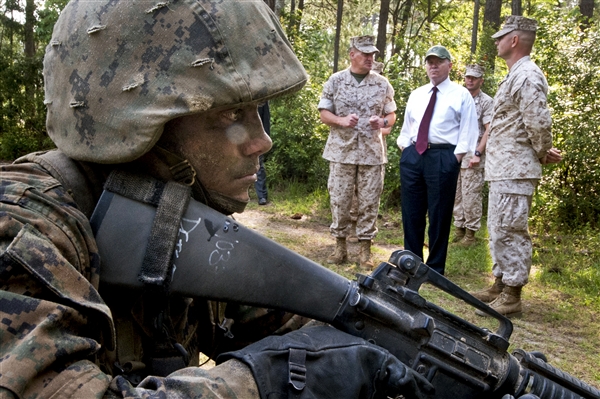WASHINGTON, Sept. 13, 2011 — NATO-led operations in Libya will continue to focus on protecting the Libyan people, and will not support either the pro- or anti-Gadhafi forces, a NATO spokeswoman said today.
“NATO’s No. 1 concern has been the protection of civilians from the very beginning of Operation Unified Protector,” Oana Lungescu said.
The alliance initiated the operation to enforce U.N. Security Resolutions 1970 and 1973 following the “gross and systematic violation” of human rights by the Gadhafi regime in Libya, said Col. Roland Lavoie of the Canadian air force, military spokesman for the operation.
“The resolutions specifically refer to the repression of peaceful demonstrators, arbitrary detentions and forced disappearances, torture and summary executions,” he explained.
NATO has effectively enforced the U.N. mandate to protect civilians, Lungescu noted. “We have saved countless lives, and by protecting Libyan civilians, we’ve helped them to gradually resume a normal life across Libya,” she said. “And [we’ve helped them] take the future into their own hands.”
NATO still is focused on protecting the Libyan people as the situation in some parts of the country remains fluid, Lungesco said.
“Our mission is not yet complete,” she said. “Six months ago when NATO, together with our partners, started [enforcing] the mandate of the United Nations Security Council, Benghazi was under threat, Misrata was under siege, and civilians were attacked and threatened every day by Gadhafi regime forces.”
NATO’s involvement, Lungesco noted, will last only as long as its mission dictates. “As the secretary general has clearly stated, we are determined to continue the mission for as long as necessary, but not a day longer than necessary,” she said. “Our clear intention is to terminate the mission as soon as the situation allows.”
Lavoie said Libya’s National Transition Council forces have attempted to peacefully resolve the disputes throughout the country.
“The areas of confrontation between Gadhafi and NTC forces on the ground have not changed drastically over the last few days,” he said. “This is essentially due to the deliberate, and very commendable, efforts of the NTC to try to resolve the situation through dialogue.
“Despite the NTC offer to seek a peaceful solution as this week progressed, it became quite clear that the remaining Gadhafi forces were not willing to negotiate and lose their grip on the cities they still control,” he added.
Lavoie said Gadhafi’s forces currently control Bani Walid and Surt and have “taken the population hostage.”
“NATO is closely monitoring the situation, of course, and will continue to do so as long as necessary, although I must stress that NATO does not and will not engage in close air support for the NTC forces as our focus remains the protection of the civilian population,” he said.
Despite these issues, Lavoie said tangible progress has been made in Libya. “The main advances in Libya are not in the military domain, but rather, in the civilian sector where we observed that the rebuilding of Libya is definitely under way,” he said.
Ground transportation movements are resuming, and shipping and humanitarian assistance flights now are routine, Lavoie noted. And many cities now have normal access to water, electricity and other basic services, he added.
Additionally, “as in many other countries around the world, schools are planning to re-open their doors soon in several regions,” the colonel said, “and several industries and refineries are being prepared to resume their activities, which will jumpstart the economic recovery of Libya.”
Taken individually, he said, these milestones may not appear significant. “But, really,” he added, “their cumulative effect is clear, and is clearly paving the way for the recovery of Libya. Today, the recovery of Libya is now quite obvious, and the outcome no longer in doubt.”
Source:
U.S. Department of Defense
Office of the Assistant Secretary of Defense (Public Affairs)

 von
von 
